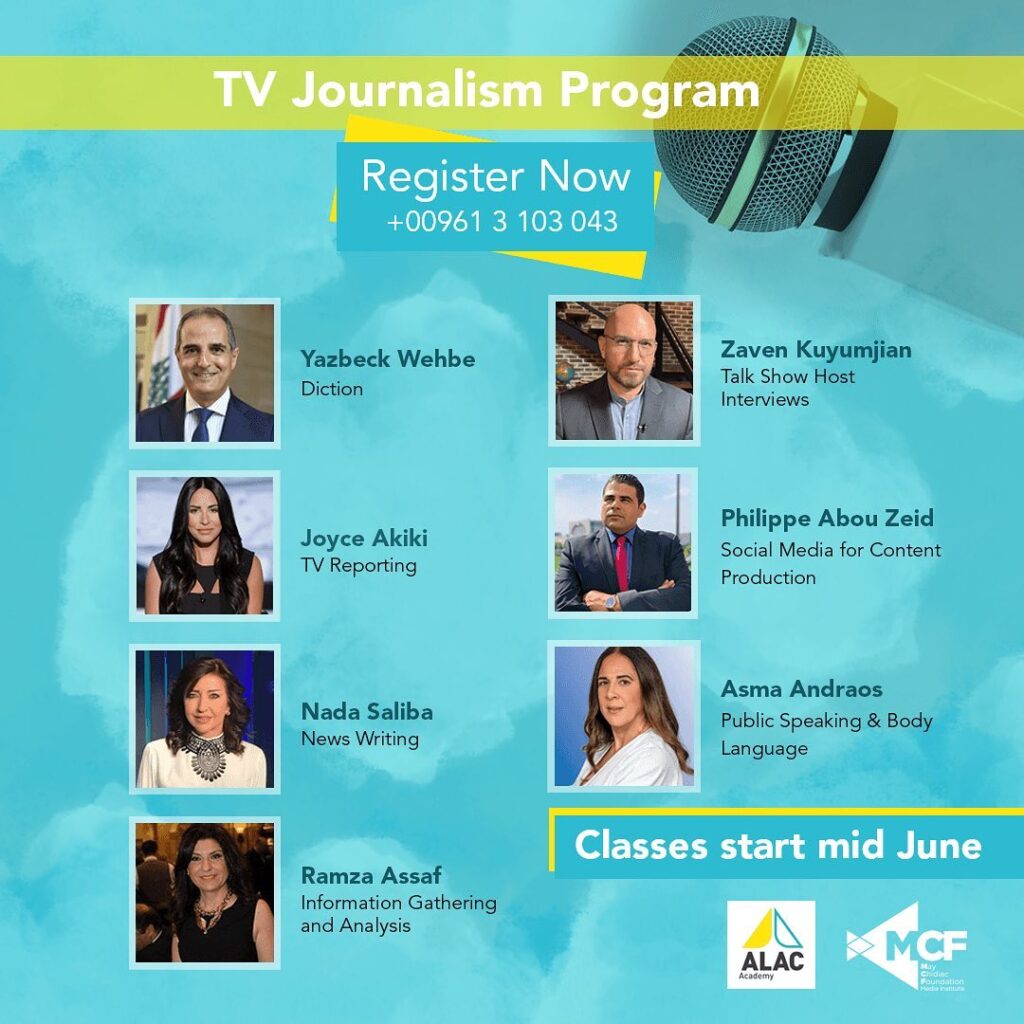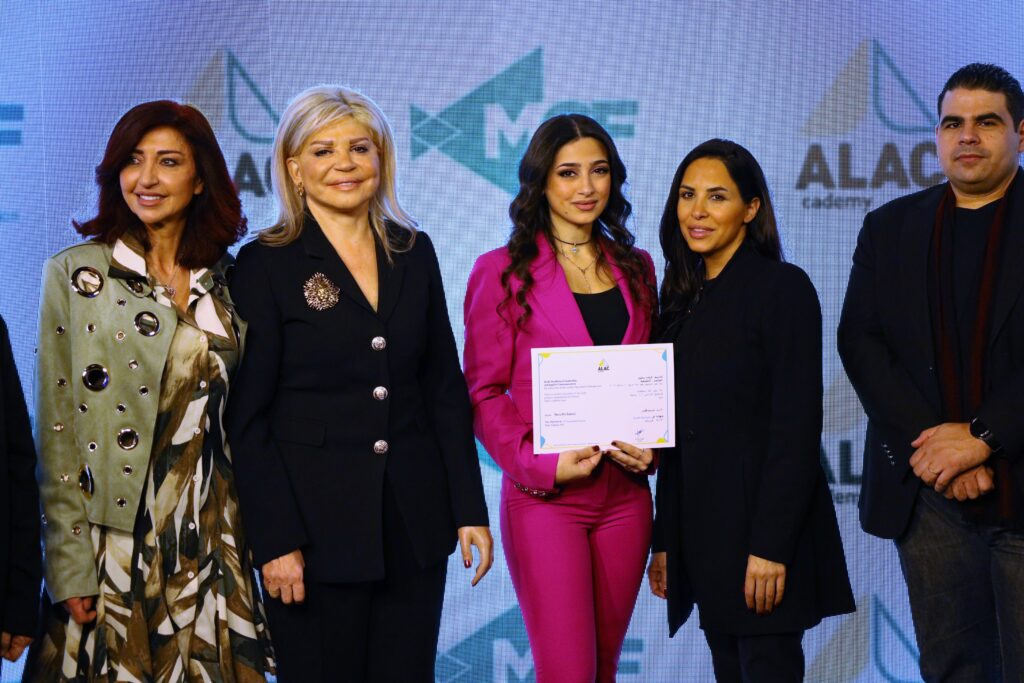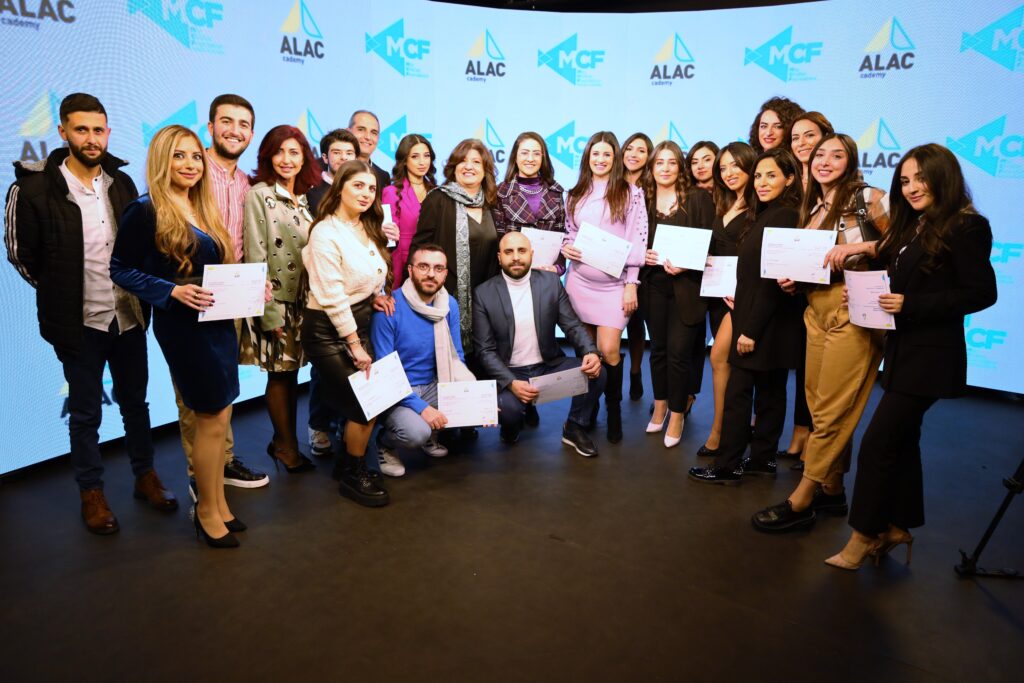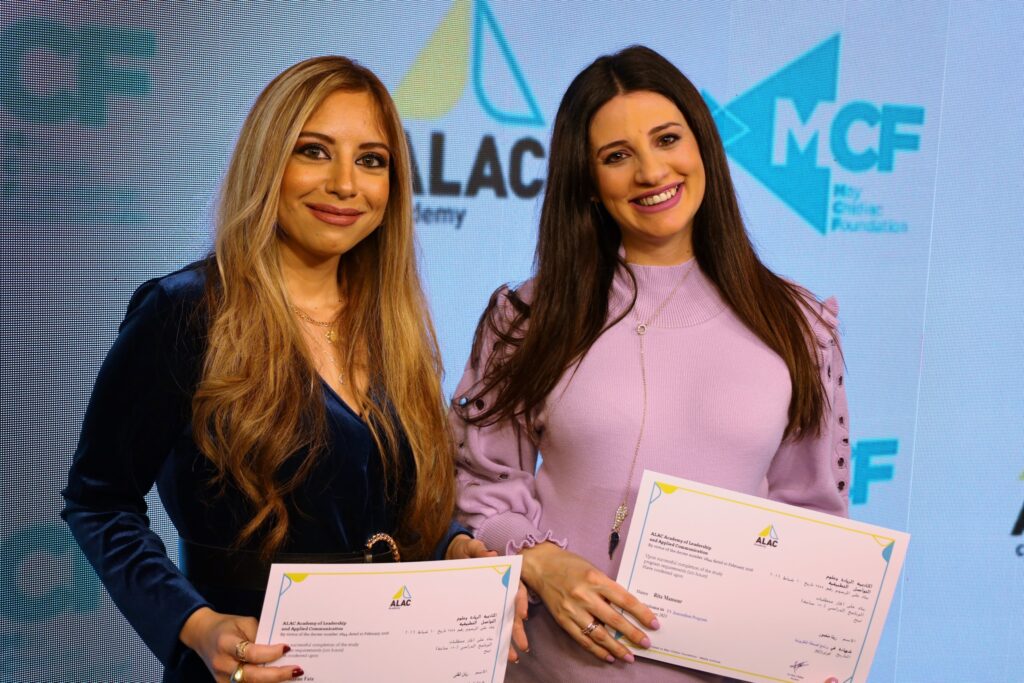
Academy of Leadership and Applied Communication
ALAC Academy of Leadership and Applied Communication is government certified and offers diplomas in subjects related to Media, Journalism, Digital Media, Communication, Marketing, Journalism, Public Relations, Leadership, Public Speaking, TV production, TV Presenting, etc. For inquiries and registrations contact us at +9613770567.
ALAC is committed to providing education techniques that encourage students to become actively involved in their learning. Students learned through experience rather than simply from a textbook.



TV presenting program
Our TV presenting program / Entertaining Programs is a 16 weeks program focused on the practical part without neglecting the theoretical foundations of the TV work. The trainees will be exposed to the real environment of the presenter’s work and entertaining programs, then they will be trained to present before cameras and produce variety shows.
As a presenter, your job could involve introducing or hosting a show, reporting on special events, interacting with live audiences or conducting interviews. The skills you learn will prepare you to work in front of the camera and behind the scenes.
Course description
- TVB 201 – Information gathering and analysis (14 hrs)
The production of journalism relies on several elements. This course introduces the students to what public information is and how to find it. Students will also acquire interviewing skills and how to process information. You will learn how to ethically gather information and engage in fact-finding for news stories, with special emphasis on covering live news events and requesting documents.
- TVB 202 – News writing (16 hrs)
This course covers the various types of writing for news and web videos. This will include storytelling and scriptwriting and further developing the students’ basic knowledge in producing, reporting, writing, shooting and editing skills. You will explore how news is delivered through mobile devices, TV, radio, Web and printed publications.
- TVP 203 – News Presenting (20 hrs)
News Presenting aims to expose students to discovering the news, reporting the news, and writing the news in different formats. Students will learn how to present news bulletins in a professional way, speak to the audience through the camera, conduct and manage the different types of interviews during the news bulletins and acquire the skill of TV news editing. The role of aiding cast, including the directors and technicians, the relationship between the newscaster and the technical department and editing teams is highlighted with the autocue and the earpiece.
- TVB 204 – Talk show & Interview (20 hrs)
The TV work in all its productions is basically based on interviews which could be a short interview in a report or a one-hour interview in talk shows. The participant will be trained on developing various stages of TV talk shows, in addition to planning and production stages for talk show programs.
Students will learn as well, how to introduce and interview guests with unfolding events, fill time on air, along with questions’ techniques. This course is designed on practical exercises to help students understand and possess the basics of producing and presenting TV talk shows and interviews.
- TVP 205 – Talk shows / Production (14 hrs)
This course is an overview about the principles, procedure and techniques of TV production. Students will learn how to operate switchers, TV cameras, and equipment. The course covers the fundamentals of producing, scripting, directing and editing for TV through practical lessons in camera techniques and photography foundation. The ALAC facilities and studios are available for students to practice.
- TVB 206 – TV Reporting (18 hrs)
This course introduces students to different styles of TV reporting; Reporting from field, PTC types and techniques, live reporting. The trainees will learn to report on events accurately, providing key insights, practical information and other relevant facts to make the news intelligible, making clear the circumstances of the situation and creating the feeling of reality: key facts, key declaration, and key persons. A particular focus shall be given to reporting on breaking news events; report as quickly as events unfold, without forgetting ethical issues.
Students will learn to develop relevant stories that provide creative storytelling opportunities, provide news updates and analysis, summarize, verify information, stay away from rumors and speculations and deal with conflicting information.
- TVB 207 – Investigative journalism (18 hrs)
This course develops the students’ critical thinking ability, introduces them to the mechanics of investigative stories, examines neglected or under reported stories, and considers issues from an ethical perspective.
Students will be able to demonstrate an initial understanding of and competence in identifying enterprising investigative stories. They will be able to gather and report investigative news in an accurate, fair, comprehensive and clear manner.



Broadcast Journalism Program
Course description
TVB 201 – Information gathering and analysis (14 hrs)
The production of journalism relies on several elements: newsgathering, interviewing sources, researching and trying to find as much information as possible. This course introduces the students to what public information is and how to find it. Students will also acquire interviewing skills and how to process information from various sources for publication.
They will learn how to ethically gather information and engage in fact-finding for news stories, with special emphasis on covering live news events and requesting documents. The course combines lectures on the techniques of information gathering as well as exercises.
TVB 202 – News writing (16 hrs)
This course covers the various types of writing for news and web videos. This will include storytelling and scriptwriting and further developing the students’ basic knowledge in producing, reporting, writing, shooting and editing skills. Students will learn the foundations of journalism and will explore how news is delivered through mobile devices, TV, radio, Web and printed publications.
Learning Outcomes: News writing aims to expose you to basic journalistic principles, and to build fundamental writing skills. By the end of the course, you can expect to have a good grasp of the fundamental issues and methods of gathering news & writing news stories.
TVP 203 – News Presenting (20 hrs)
News Presenting aims to expose students to the foundations of journalism and its main components: discovering the news, reporting the news, and writing the news in different formats. Students will learn how to present news bulletins in a professional way, speak to the audience through the camera, conduct and manage the different types of interviews during the news bulletins and acquire the skill of TV news editing. The role of aiding cast, including the directors and technicians, the relationship between the newscaster and the technical department and editing teams is highlighted with the autocue and the earpiece.
TVB 204 – Talk show & Interview (20 hrs)
The TV work in all its productions is basically based on interviews which could be a short interview in a reports or a one-hour interview in a talk shows. The participant will be trained on developing various stages of TV talk shows, in addition to planning and production stages for talk show programs.
Students will learn as well, how to introduce and interview guests with unfolding events, fill time on air, along with questions’ techniques. This course is designed on practical exercises to help students understand and possess the basics of producing and presenting TV talk shows and interviews.
TVP 205 – Talk shows / Production (14 hrs)
This course is an overview about the principles, procedure and techniques of TV production. Students will learn how to operate switchers, TV cameras, and equipment. The course covers the fundamentals of producing, scripting, directing and editing for TV through practical lessons in camera techniques and photography foundation. The ALAC facilities and studios are available for students to practice.
TVB 206 – TV Reporting (18 hrs)
This course introduces students to different styles of TV reporting; Reporting from field, PTC types and techniques, live reporting. The trainees will learn to report on events accurately, providing key insights, practical information and other relevant facts to make the news intelligible, making clear the circumstances of the situation and creating the feeling of reality: key facts, key declaration, and key persons. A particular focus shall be given to reporting on breaking news events; report as quickly as events unfold, without forgetting ethical issues.
Students will learn to develop relevant stories that provide creative storytelling opportunities, provide news updates and analysis, summarize, verify information, stay away from rumors and speculations and deal with conflicting information.
TVB 207 – Investigative journalism (18 hrs)
This course develops the students’ critical thinking ability, introduces them to the mechanics of investigative stories, examines neglected or under reported stories, and considers issues from an ethical perspective.
Students will be able to demonstrate an initial understanding of and competence in identifying enterprising investigative stories. They will be able to gather and report investigative news in an accurate, fair, comprehensive and clear manner.

